“Carpet vs Hardwood Flooring” can be a dilemma for homeowners seeking comfort and elegance in their living spaces.
In this article, we are going to explore the differences between these materials, focusing on the following features: durability and maintenance, allergen retention, longevity, resale value, versatility, environmental impact and price.
As we delve into the comparison of Carpet vs Hardwood Flooring, we’ll explore not only the aesthetic differences but also the practical considerations that influence homeowners decisions.
Introduction to Carpet
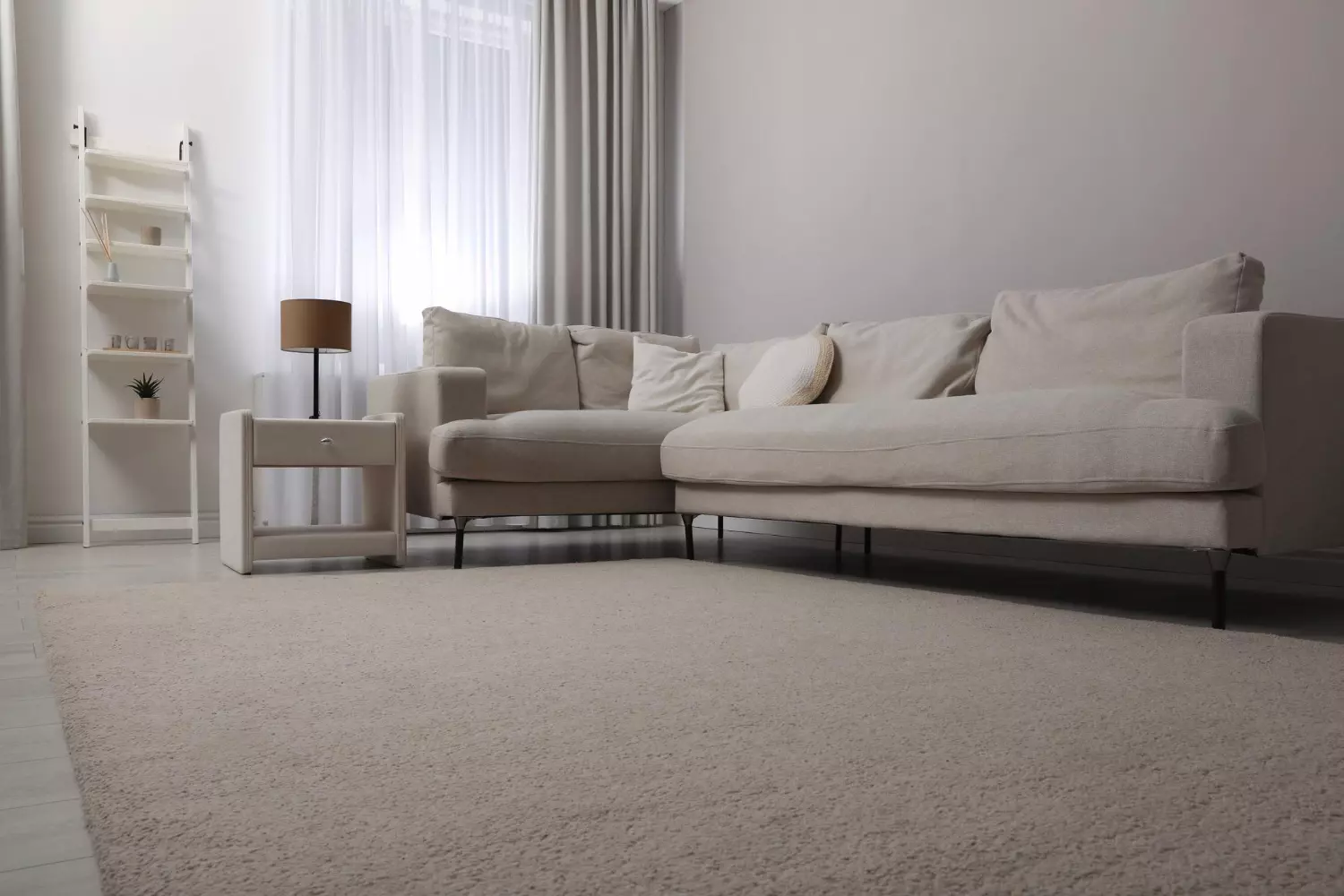
Carpet flooring is made from various materials such as wool, nylon, polyester, or polypropylene.
One of the appeals of carpeting is its softness, making it highly used in bedrooms, living rooms, and other areas where comfort is important.
However, carpeting requires regular maintenance to keep it clean and free from allergens, dust, and stains. Depending on the material and construction, carpets may also be prone to wear and tear over time, especially in high-traffic areas.
Carpets also have a tendency to trap allergens such as dust, pollen, and pet dander within their fibers, which can exacerbate respiratory issues and allergies.
Additionally, the moist environment created by spills or high humidity levels can foster the growth of mold and mildew, further contributing to indoor air pollution.
Introduction to Hardwood Flooring
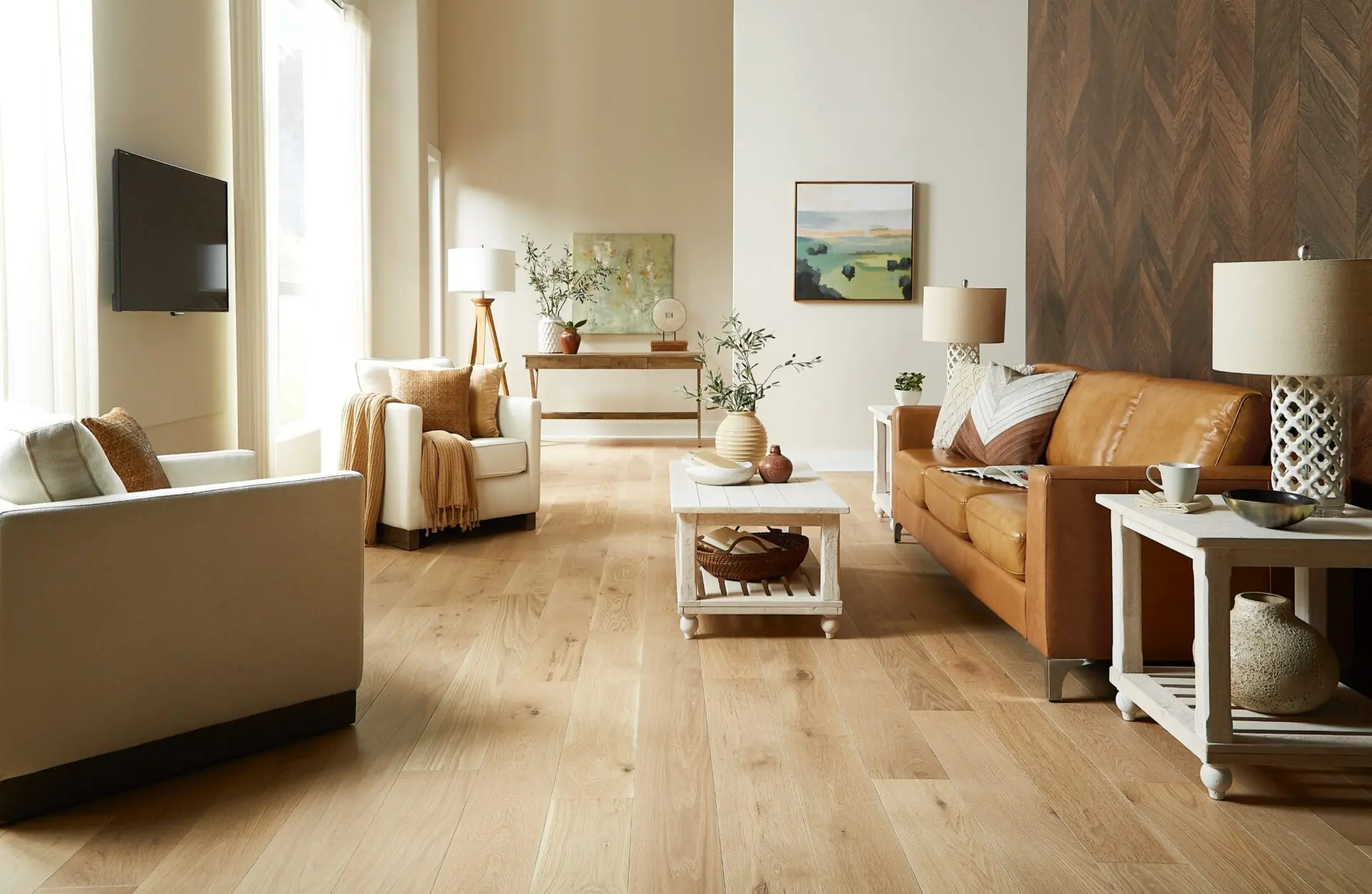
Hardwood flooring is a classic and enduring option for enhancing the beauty and charm of any space.
Made from natural wood, such as oak, maple, or cherry, hardwood floors offer a warm and inviting ambiance that adds character to any room.
One of the key features of hardwood flooring is its durability. Unlike other flooring materials, hardwood can withstand the test of time, lasting for generations with proper care.
Additionally, hardwood floors come in a variety of finishes and styles, allowing homeowners to choose the perfect look to complement their interior design preferences.
What’s the difference between carpet vs hardwood flooring?
Take a look at this Carpet and Hardwood Flooring comparison table. We will explain each of these features and how they differ.
Keep reading!
| Feature | Carpet Flooring | Hardwood Flooring |
| Durability and Maintenance | Prone to wear and tear, high maintenance | Highly durable, resistant to scratches and dents, low maintenance |
| Allergen Retention | Can trap allergens like dust, pet dander, and pollen, potentially harmful to health | Less likely to trap allergens, provides a healthier indoor air quality |
| Longevity | 7-10 years | Can last 50 years or more |
| Resale Value | Low resale value | Adds significant resale value to a home |
| Versatility | Wide range of design options | Less versatile, but complements various design styles |
| Environmental Impact | May be made from synthetic materials | Natural, renewable resource when sourced responsibly |
| Price | Generally more affordable upfront, but may require more frequent replacement. | Initial investment may be higher, but offers greater long-term value and durability. |
Carpet vs Hardwood Flooring: Durability and maintenance
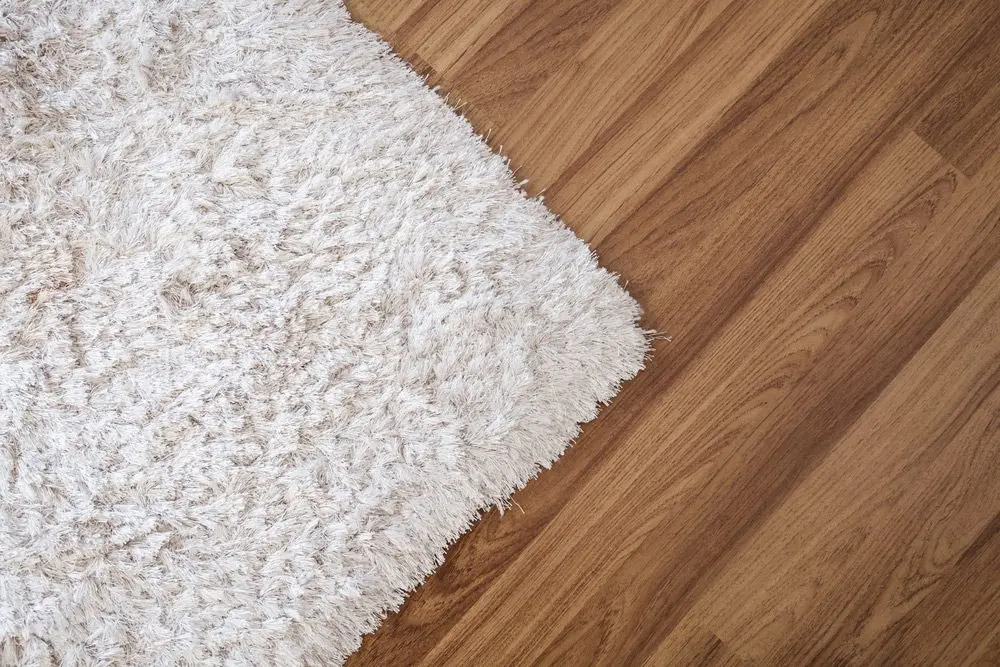
When it comes to durability, hardwood flooring holds the upper hand over carpet.
Hardwood floors are renowned for their ability to withstand heavy foot traffic, scratches, and general wear and tear far better than carpets.
Unlike carpet fibers that can show signs of wear over time, hardwood flooring can maintain its original beauty for decades with proper care and maintenance.
Hardwood floors also offer greater resistance to stains and spills compared to carpets, which can absorb liquids and become permanently damaged or discolored.
While spills on hardwood flooring should still be promptly cleaned to prevent potential damage, the risk of long-term staining is lower compared to carpet.
Moreover, hardwood flooring can be refinished, allowing homeowners to refresh its appearance and address any surface imperfections.
In contrast, carpets may need to be replaced entirely if they become extensively worn or stained, making hardwood flooring a more cost-effective and sustainable option.
Carpet vs Hardwood Flooring: Allergy Retention
In terms of allergy retention, hardwood flooring stands out when compared to carpeting.
Carpets have a tendency to trap allergens such as dust mites, pollen, pet dander, and mold within their fibers, which can exacerbate allergies and respiratory issues.
Hardwood flooring, on the other hand, offers a smoother surface that doesn’t harbor allergens as readily as carpets.
With regular sweeping or mopping, dust and allergens can be easily removed from hardwood floors, reducing the potential for allergic reactions and creating a healthier indoor environment.
Carpet vs Hardwood Flooring: Longevity
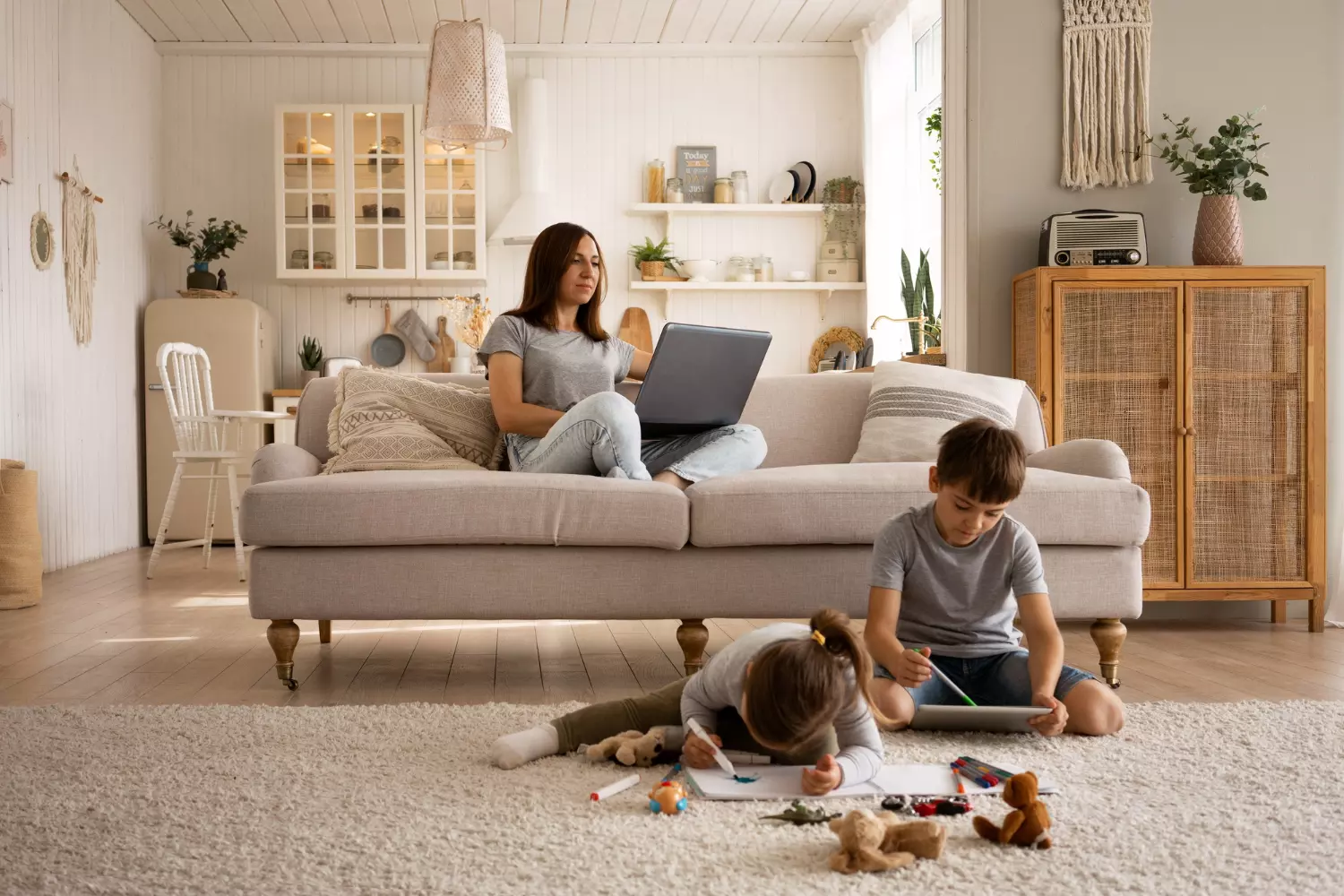
When it comes to longevity, hardwood flooring keeps outshining carpet by a significant margin.
Hardwood floors are renowned for their durability and ability to withstand the test of time, often lasting for several decades or even generations, with some hardwood floors retaining their beauty and structural integrity for up to 50 years or more with proper care and maintenance
In contrast, carpet typically has a much shorter lifespan, ranging from 5 to 15 years depending on the quality of the carpet and the level of foot traffic it receives.
Over time, carpets can become worn, matted down, and stained, detracting from the overall appearance of the room and necessitating replacement.
Carpet vs Hardwood Flooring: Resale Value
Hardwood flooring typically provides higher resale value and broader market appeal.
Carpets, though comfortable and available in various styles, depreciate faster than hardwood flooring. Moreover, it is prone to stains, wear, and tear, factors that can detract from a home’s perceived value and appeal to potential buyers.
Conversely, hardwood flooring exudes timeless elegance and durability. Homes with hardwood floors tend to command higher resale prices and attract more buyers due to their longevity and aesthetic appeal.
Carpet vs Hardwood Flooring: Versatility
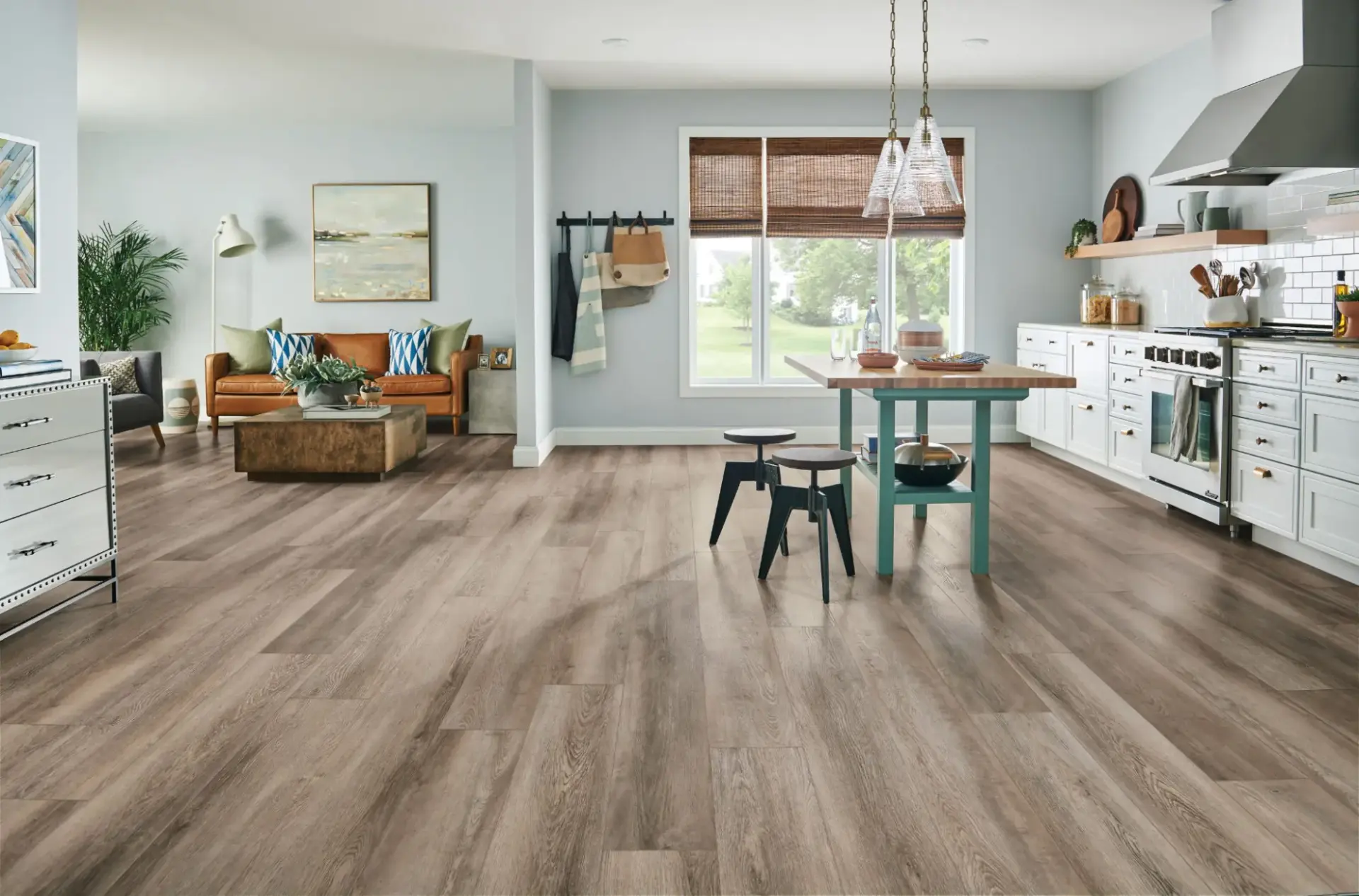
When considering versatility, carpet offers a wide range of styles, colors, and textures, allowing for greater customization and flexibility in interior design. However, despite this, carpeting’s disadvantages often outweigh its versatility.
In contrast, hardwood flooring, while offering fewer design choices, provides a timeless and elegant aesthetic that complements various interior styles.
Hardwood flooring offers a balance of versatility, durability, and timeless appeal and beauty, making it a superior choice for homeowners seeking a long-term flooring solution.
Carpet vs Hardwood Flooring: Environmental Impact
When considering environmental impact, hardwood flooring is often sourced from responsibly managed forests, where trees are replanted to ensure the long-term sustainability of the wood supply.
Moreover, many hardwood flooring manufacturers adhere to eco-friendly practices, such as using water-based finishes and adhesives with low volatile organic compound (VOC) emissions.
Some hardwood flooring options also come from reclaimed or salvaged wood, further reducing the environmental impact by repurposing materials that would otherwise go to waste.
In contrast, carpeting typically has a larger environmental footprint due to its manufacturing process, which often involves the use of synthetic materials derived from fossil fuels.
Additionally, carpets may contain chemicals such as formaldehyde and flame retardants, which can release harmful emissions into the indoor air over time.
Carpet vs Hardwood Flooring: Price
When comparing the prices of carpet and hardwood flooring, several factors come into play that influence their overall cost and value.
Carpeting tends to be more budget-friendly upfront, with installation costs ranging from $2 to $18 per square foot.
However, it’s essential to consider the long-term costs associated with carpet maintenance and replacement, as carpets typically need to be replaced every 5 to 15 years due to wear and tear.
On the other hand, hardwood flooring commands a higher initial investment, ranging from $5 to $25 per square foot for materials alone.
However, hardwood floors offer exceptional durability and longevity, lasting for decades or even centuries with proper care and maintenance. This makes hardwood flooring a cost-effective choice in the long run, as it eliminates the need for frequent replacements associated with carpeting.
Therefore, comparing all the factors and characteristics mentioned, Hardwood Flooring stands out as a better option for valuable and safe homes.
More about Hardwood Flooring benefits
- Timeless Elegance: Hardwood flooring adds a touch of sophistication to any home, enhancing its overall aesthetic appeal and charm.
- Easy to Refinish: Hardwood floors can be refinished multiple times to remove scratches and restore their original luster, extending their lifespan and maintaining their beauty.
- Hygienic Surface: With its smooth and flat surface, hardwood flooring is easy to clean and disinfect.
- Adaptable to Various Interior Designs: From traditional to modern, hardwood flooring complements a wide range of interior design styles.
- Stain Resistance: Hardwood flooring is naturally resistant to stains and spills, making it easier to maintain and clean compared to carpets.
- Time and Cost-Efficient Installation: While installation costs may vary, hardwood flooring generally offers a quicker and more cost-efficient installation process compared to other flooring options.
- Pet-Friendly Flooring Option: Hardwood floors are durable and scratch-resistant, making them an ideal choice for homes with pets.
Overall, hardwood flooring enhances the value of a home by combining elegance, durability, and practicality, making it a desirable choice for homeowners and potential buyers alike.
Conclusion
In conclusion, when comparing carpet and hardwood flooring, it’s evident that hardwood flooring emerges as the superior choice in various aspects.
For those considering hardwood flooring for their homes, Eco Flooring USA offers a wide range of options to suit every style and budget.
Eco Flooring USA’s catalog provides high-quality flooring solutions designed to elevate your home’s beauty and functionality.
With Eco Flooring USA, you can trust that you’re investing in flooring that not only enhances your home’s value but also contributes to a more sustainable and healthy living environment.



